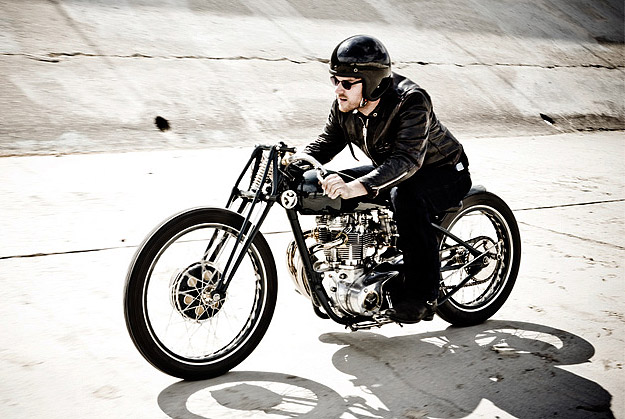
Ian Barry runs Falcon Motorcycles with his partner Amaryllis Knight. He’s the builder of the Bullet and the Kestrel, the first in a series of ten custom British motorcycles. At the moment he’s working on the Black Falcon, based on a Vincent Black Shadow.
What was the first motorcycle you bought with your own money? This was my first bike [below] and while technically not a motorcycle, it was my first exhilarating encounter with raw, steep, driveway speed—I think it even had a little handbrake for a dramatic, melted plastic, lockup finish at the end. My little brother Holland had mastered the art of Cash On Delivery at the age of four, so although I didn’t put the cash out on the front end, I definitely paid for it (and a plastic Castle Grey Skull equipped with Skeletor mic) on the back end later that day.
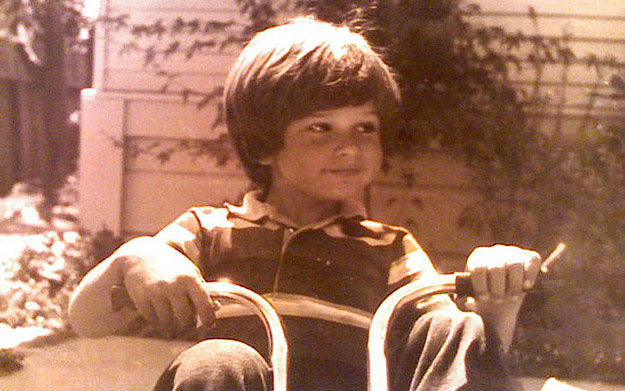
My first two wheeled, non-human/gravity powered vehicle was a 1967 Triumph Bonneville, fully loaded: distressed purple metal flake, three-inch-over forks, snoopy seat, and too many miles in the wind. After following the sage advice of the previous owner—”all it needs is a new battery, spark plugs, and maybe an oil change and you’re good to go”—I made various unsuccessful land speed attempts down the street, each time collecting a new fallen-off and run-over piece from the middle of the road. It dawned on me that I was the owner of a rolling basket case, not a motorcycle, and took it apart the rest of the way.
After weeks of trying to make sense of the hundreds of pieces I’d scattered around my ‘shop’ (back patio), I yearned for a more modern form of transportation while working on my project bike. I purchased a 1970 Commando [below] for about $1200, my first real “running” bike. It still remains the newest motorcycle I own. As it turned out 26-year-old bikes have just as many issues as 23-year-old bikes, so in no time, the Norton was intertwined with pieces of the Triumph on my floor. This was the first wakeup bell that quickly became a symphony of British bike idiosyncrasy. My daily catharsis, and ultimately the impetus for my obsession with British bikes. I realized true enjoyment only exists for me when it’s a wholehearted affair; the barrier for entry back then felt like it might as well have been a speakeasy password, spirit summoning dance, and decryption cipher—but in the end it was just hard work, honesty and patience, and I love that.
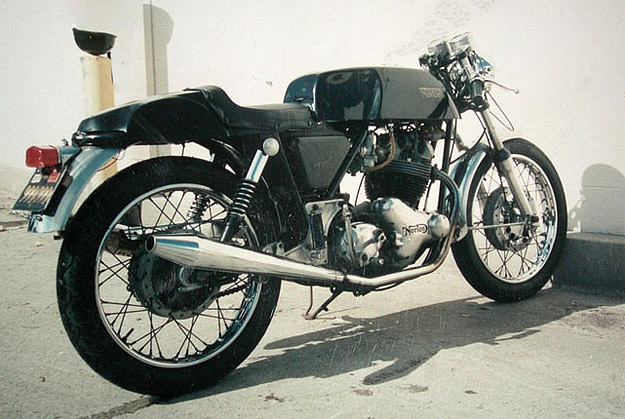
Above: My 1970 Norton Commando I bought stock in the early 90s, just after modifying it and putting it back together for the first time.
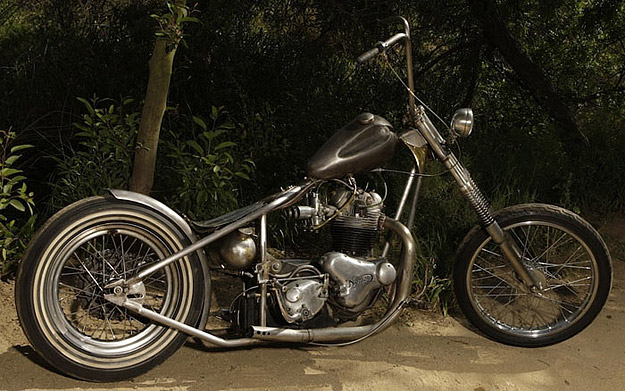
Above: A later incarnation of the same Commando in 2002. I’d never seen a Commando chopper at the time, so I thought I would make something minimal and kind of ridiculous, but in a good way. I have a new direction for this one that’s got me really exited and am trying to find the time to make it happen.
What do you think is the most beautiful production motorcycle ever built? That’s difficult because there isn’t one motorcycle that embodies all the elements that I find beautiful. I suppose in my mind, most beautiful means a bike I like so much that I wouldn’t change a thing about it: the bike I would keep stock and ride just the way it rolled off the factory floor. While I think the Vincent Black Lightning is beautiful, I wouldn’t change a thing about a “Series A Rapide” [below]. It’s raw and mean: pure, elegant, yet unpretentious. It’s just right.
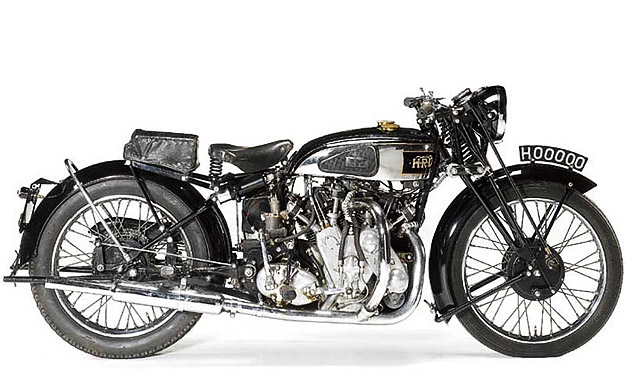
The late 30s Triumph Speed Twin [below] held the title of ‘most beautiful’ through most of my adolescent and young adult life.
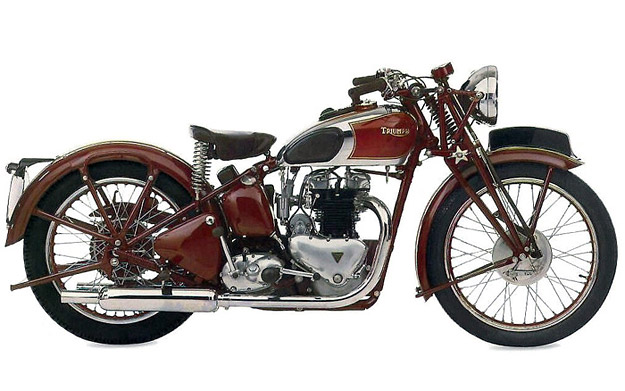
The 1923 BMW R32 always does funny things to me as well.
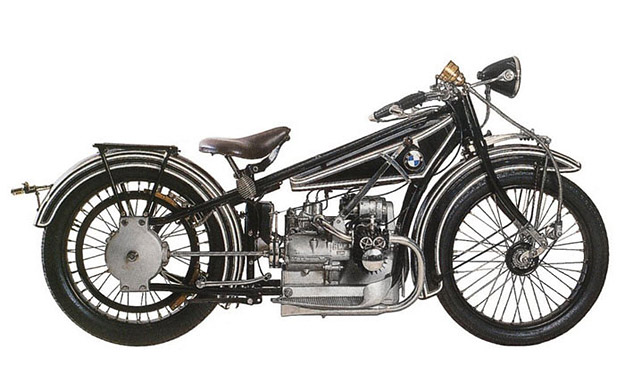
What motorcycle do you despise? The 500-pound gorilla skeleton in the form of a neglected frame in the corner of the room: all intention, unrealized potential. It sits there reminding me about how little time there is to do all of the things I want to do. Like unfulfilled promises that bat around like moths drawn to the light, with no reward at the filament! I have a couple of these non-Falcon project bikes and I loathe them, because I love them and there is nothing worse than seeing something I love taunting me, while it starts to collect dust.
What is your idea of perfect happiness? That place I get to when I feel like I’ve succeeded in mastering something and can’t take it any further. Then I find myself humbled, realizing that there are entire new worlds to discover in that direction. Knowing that there are lifetimes of things I’d like to learn and experience and that I have the privilege of pursuing at least one of them. Long months of hard work trying to meet impossible deadlines, unable to stop because ideas are flowing. Finishing a project and hearing a motor start up for the first time.
I often hear people say “… that first ride after finishing a bike…” and I agree with that too, but the actual ‘first ride’ for me, the one where the excitement really sets in, is the one after all the kinks have been worked out, the engine is broken in, and you just go, without the catalog in your head of fasteners that need a re-torque or listening with every part of your body for that possible problematic noise in that fresh engine.
Reading. Getting breathing room from the shop: Amaryllis and I spending time together. Taking the dogs to the beach or Angeles Crest Forest and watching them go ballistic for hours. Being alone in the shop at night with my thoughts, a good beer, and a fragrant cocktail of aged petroleum keeping me company. Days like this:
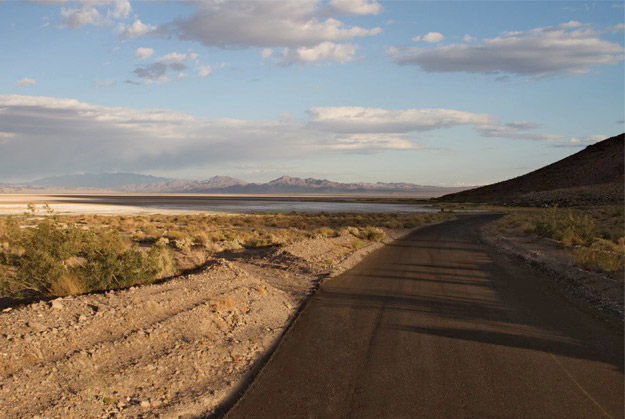
Electric motorcycles: Yes or No? Yes, because to ignore electric motorcycles—purely because of an obsession with combustion powered ones—limits my imagination of what’s possible on two wheels. I love old bikes but they were once new, trying to out-perform the one before. When I bring an old bike skeleton back from the dead, I try to refine it with technology, forms, and materials that weren’t available when it was made… but at the end of the day, it’s still built within a framework of vintage elements. In the modern bike world, the ‘frame’ of mind is the present and the future, so if an electric engine is what ends up fueling (no pun) a superior-performing and interesting motorcycle, then who’s to say that it’s not part of the ‘perfect’ evolution of a modern bike?
What is your favorite journey? The one I started ten years ago when I quit my day job so that I could start building motorcycles full time. I feel extremely lucky to be able to work hard and do the thing I love every day. I wasn’t easy and it took a lot of sacrifices to get to a place where I feel completely inspired. I spent years of my life building bike after bike in order to develop ideas that I’ve been dying to make happen. I had to believe that I was on the right track even when it wasn’t paved with a motorcycle shop, or even a roof over my head at times. I’m thankful for the good and the less, and being on a journey in the first place. And I love roads in the middle of nowhere.
Which ‘everyday’ modern bikes do you think will become future classics? The equivalent of the Honda CB750 or Moto Guzzi V7 Sport, if you like? I think there’s one waiting to happen, I don’t think it will be in the form of a fossil fueled motor. I think it will have to be a bike that represents a dawn of a new era of motorcycle. It’s not to say that there aren’t modern bikes that have made big technological leaps, but the bikes we view as ‘classics’ today represent huge leaps in design and technology, when compared to the incremental ones in the past two decades or so. The R1 in 1998, the first factory “streetfighters” like the Ducati Monster and Triumph Speed Triple in 93/94, the Hayabusa in 96, the stripped-down R1200GS in 04… all mark evolutions and new beginnings that might someday garner the title ‘classic’. But the last huge leap was in the 80s with the introduction of the Japanese fairing-clad 150mph sportbikes, which can all be considered classics now 20+ years later…so…
Who are your real-life motorcycling heroes? My Great-Grandmother and Great-Grandfather [below, in Holland]. Phil Irving, John Britten, Rossi, Harold Willis, George Brough, Ed Turner, Sid Biberman, Collier Brothers, Max Friz, Arthur Carrol…
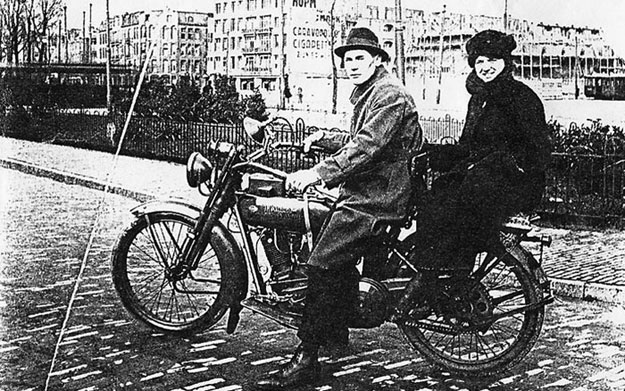
Are you optimistic for the future of motorcycling? For sure, with customs too. There’s been a tipping point that stemmed from too many people trying to purely profit from either cookie-cutter or steroid-meets-meth-lab customs and theme bikes, and now there seems to be a new bike world opening up: builders, enthusiasts, and motorcycle companies that are in it for long haul, and for genuinely original reasons.
I’m seeing more and more basket two-wheeled machines brought back to life after long retirements in their milk crates and cardboard boxes. There’s a steady increase in people doing the work themselves and asking questions, which builds a better understanding of a motorcycle’s anatomy and makes for better riders too. I think it breeds a different type of motorcyclist who get the nuance, understands the mechanics, and so can fully enjoy every aspect of a motorcycle and riding it. I like the idea of a community of riders that respect motorcycle eras, nationalities, and styles. Its a good feeling to see a group of riders and bikes—vintage, modern, custom, Japanese, Italian, German, American, English…. The clique thing was tired in High School and in my experience it should have been retired there: The point, at least for me, is that as the minority in transportation, we get to do it our way. Basically, until we figure out how to sprout wings, I think two wheels and/or personal open air transportation will always lead and evolve in the core of countless imaginations and garages.
What is your current State of mind? Vincent.
Follow Ian Barry’s work via the Falcon website.